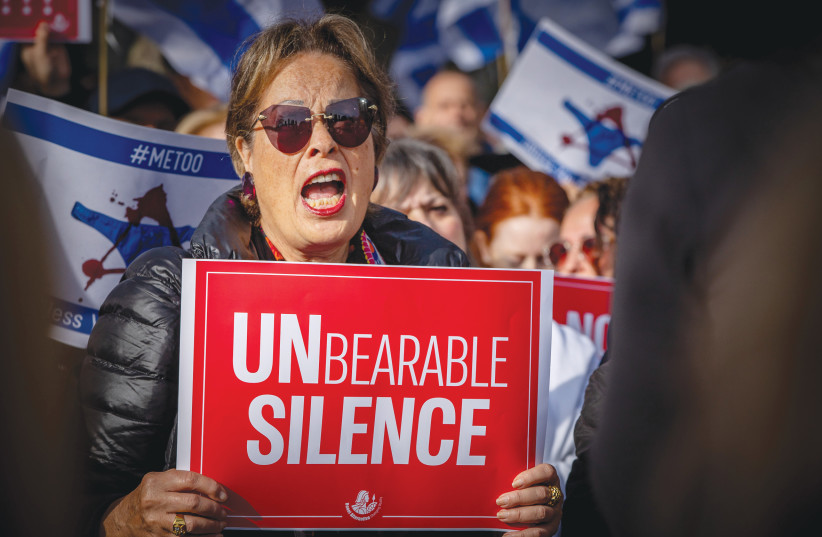‘Feminism is the belief in the social, political, and economic equality of the sexes.” I remember reading this definition of feminism in my early 20s, and it felt like a revelation. It was more than just a definition – it was a promise. A promise that my voice, as a woman, would be heard.
A promise that all women, regardless of race, religion, or nationality, would stand together in solidarity. I believed feminism was a universal truth, one that transcended political and cultural divides.
But on October 7, as I sat in terror watching my people – Jewish women like myself – being raped, kidnapped, and slaughtered by Hamas terrorists, I realized that this promise had been broken.
The feminist movement, which once felt like a refuge for all women, was suddenly silent. No marches, no outrage, no social media campaigns demanding justice for the Jewish women brutalized by terrorists.
The feminism that had once made me feel empowered now felt like an exclusive club – one where Jewish women were not welcome.

This awakening wasn’t only about the horrific events of that day; it was about the global response – or rather, the lack of it.
The feminist movement, which should have led the charge in condemning such violence, was nowhere to be found. I waited for the outcry, for the “I Stand With Israeli Women” hashtags to flood social media. Instead, what I saw were excuses, rationalizations, and a disturbing silence from the very organizations that claim to fight for women’s rights.
Selective empathy from the feminist movement
This isn’t the first time I’ve seen selective empathy from the feminist movement, but the stakes have never felt so high. As of today, five young Jewish women are still being held hostage in Gaza by Hamas.
Their lives hang in the balance, yet the global feminist movement remains eerily quiet.
It’s impossible not to recall 2014, when Islamist terrorist group Boko Haram kidnapped 276 Nigerian schoolgirls. The world united in outrage.
The #BringBackOurGirls campaign became a rallying cry for justice with celebrities, politicians, and activists demanding their release. Social media was flooded with posts, marches were organized, and global pressure mounted.
But now, as Jewish girls are being held by Hamas, another Islamist terrorist organization, the silence is deafening. Where is the equivalent outrage? Where are the campaigns? Why is it different this time?
The answer is difficult to confront, but increasingly clear: Jewish women, particularly Israeli women, do not fit into the feminist narrative. When violence is perpetrated against us, it doesn’t generate the same level of concern.
We are seen as politically inconvenient and our suffering is dismissed or ignored because it doesn’t align with the worldview of certain activists and movements.
As a Jewish feminist, this has been a deeply painful realization. Feminism, which once felt like a powerful tool for solidarity and empowerment, now feels fractured, politicized, and exclusionary.
The feminist movement has been hijacked by political agendas that selectively apply their principles depending on the identity of the victim.
'Jewish pain does not matter'
When feminist organizations fail to speak out against the atrocities committed against Jewish women, they send a clear message: Jewish pain does not matter.
This painful awakening has led me to question the future of the feminist movement itself.
How can we claim to stand for women’s rights if we selectively decide which women deserve protection? How can we talk about equality when Jewish women are erased from the conversation?
The feminist movement, at its core, should be about defending the rights and dignity of all women, regardless of their political or religious affiliations. Anything less is a betrayal of the movement’s very purpose.
The violence of October 7 wasn’t just an attack on Israel – it was an attack on the universal principles of human rights and dignity.
The silence from the feminist movement in response to these atrocities is not just troubling – it’s dangerous. It signals that the lives of Jewish women are less valuable and less deserving of the world’s empathy and protection.
If feminism is to mean anything at all, it must be a movement that transcends politics. It must be a movement that stands up for all women, in all places, at all times. Jewish women, like all women, deserve to feel safe, heard, and protected.
We cannot allow feminism to be used as a tool of exclusion, because when we abandon one group of women, we undermine the movement as a whole.
As a Jewish feminist, I refuse to be silent in the face of this betrayal.
We must demand that the feminist movement live up to its promises.
We must remind the world that true empowerment is not achieved by elevating one group of women at the expense of another.
Only when we reclaim the spirit of inclusivity and solidarity can we begin to rebuild a feminist movement that is worthy of its name.
The writer is a new immigrant from France who made aliyah in October 2022. She currently works as the press and media coordinator for the Zionist Organization of America, where she advocates for Zionist values and supports pro-Israel initiatives globally.
